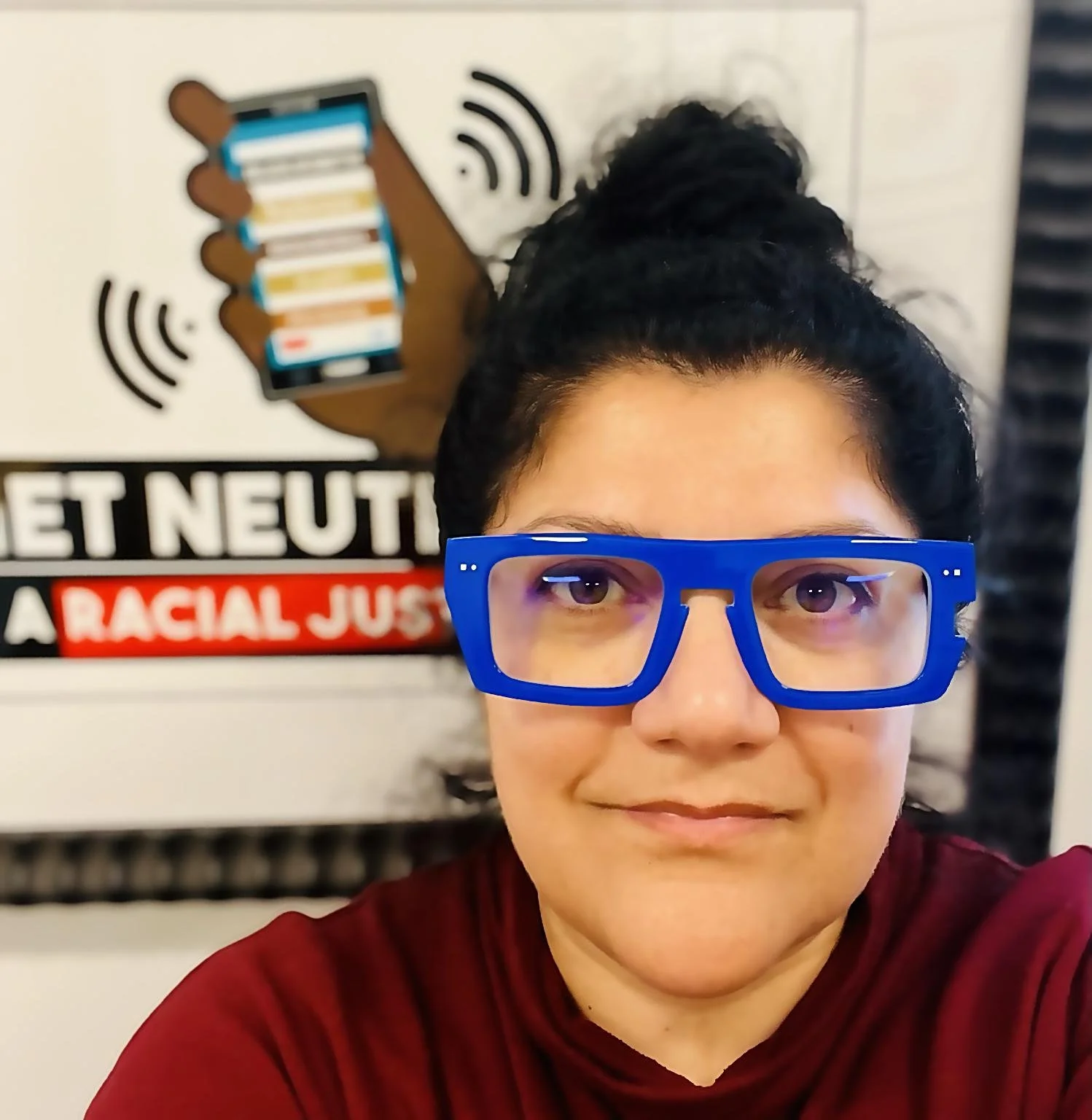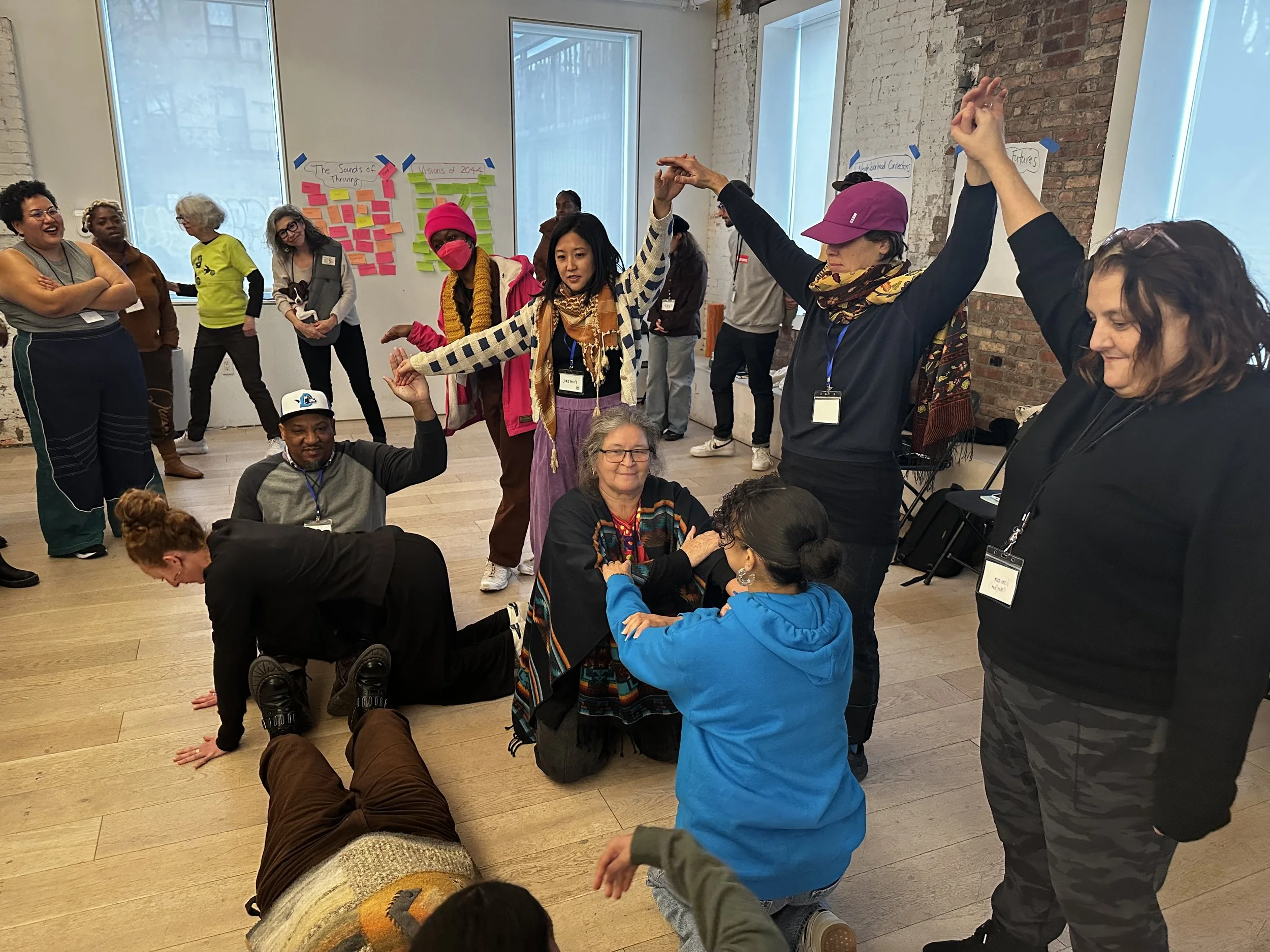‘In Focus’ – An Interview with amalia deloney
amalia deloney (she/her/ella) is a strategist, futurist, and storyteller working at the intersection of imagination, equity, and systems change.
A displaced Guatemalan, transnationally adopted and raised in a multiracial household, amalia draws on ancestral wisdom, narrative strategy, and community-based practice to help people imagine and build futures worth inheriting. She is the founder of Point A Studio, a regenerative futures lab based in Baltimore.
amalia deloney | Founder of Point A Studio
“Point A is both a studio and a stance. I built it after a career in racial justice advocacy and philanthropy — spaces where I learned the limits of reform and the necessity of reimagining.”
Tell us about yourself and your work.
I’m a Guatemalan-born, U.S.-raised Woman of Colour, transnationally adopted and displaced. I founded Point A Studio — a regenerative futures lab working at the intersection of strategic foresight, participatory design, and systems change. My work centers imagination, power-building, and narrative strategy to help communities name what matters and build what’s next.
I was raised in a multiracial household, shaped by both love and complexity. The experience of being displaced and adopted across borders is not a footnote in my story — it’s foundational. It taught me early on to pay attention to what’s said and unsaid, to find belonging beyond binaries, and to question the systems that move people without consent. That lens shapes everything I do.
I’ve spent the last two decades working alongside people and organizations on the frontlines of change. My background is rooted in community-centered praxis, where learning happens through lived experience and solutions are co-created. For me, futures work isn’t abstract — it’s grounded in real people, real places, and the need to shift systems. Sometimes that looks like movement building, policy advocacy, or program design. Other times it’s deep listening, storytelling, or collective visioning.
Point A is both a studio and a stance. I built it after a career in racial justice advocacy and philanthropy — spaces where I learned the limits of reform and the necessity of reimagining. What began as a consulting practice has become a space for deep systems listening, creative disruption, and future-calling. It’s not just a business; it’s a practice rooted in ancestral wisdom, narrative strategy, and speculative design — a place to bring together everything I know about what must be dismantled, and what’s ready to be made real.
At its core, Point A is a belief that we can begin again — that futures aren’t meant to be predicted, but shaped.
What are some of the challenges or barriers you have faced, and continue to face in your industry as a racialized Woman of Colour?
In this work, invisibility and hypervisibility often go hand in hand. I’ve been the only Woman of Colour in rooms that talk about systems change without acknowledging the systems we live in. I've been brought in for perspective, but not for power. And I’ve watched as our ways of knowing — intuitive, relational, imaginative — are dismissed in favour of frameworks that are cleaner on paper but hollow in practice.
There’s also the emotional labor of navigating spaces that don’t see the full picture of who we are. Throughout my career, I was often both the first and the only — first Woman of Colour hired, only one in the room, first to raise certain truths, only one expected to hold it all together. First and only transnational adoptee. First and only person naming systems that others didn’t yet have language for. The list goes on. That came with a kind of harm that’s hard to name: the loneliness of no mirrors, the pressure to conform, the exhaustion of holding contradictions without support. The dissonance of being asked to represent a community while being isolated from it. Where strategy is welcomed, but spirit isn’t. Where stories are requested, but the systems that shaped them go unnamed. Where our ability to hold complexity is used, but rarely supported. Too often, Women of Colour are asked to serve as both translator and transformer — expected to fix what we didn’t break, with tools we had to build ourselves.
“There’s also the emotional labor of navigating spaces that don’t see the full picture of who we are. Throughout my career, I was often both the first and the only — first Woman of Colour hired, only one in the room, first to raise certain truths, only one expected to hold it all together.”
FutureCraft: Collective Imagination for Thriving Neighbourhoods, a workshop to reimagine the future of their neighboUrhoods and identify bold actions to realize those visions.
What are some tools, resources, strategies, and approaches you use to cope with these challenges?
It’s been a journey to learn how to take care of myself. To put my own needs first. To lead in a way that’s regenerative — not extractive. I didn’t inherit a map for how to do this. I had to build one. I had to develop my own wayfinding tools — language, rituals, practices, and ways of feeling that could hold the complexity of being a Woman of ColoUr, a displaced Guatemalan, someone transnationally adopted and raised in a multiracial household. My purpose was never going to be found in the degrees I was taught to chase, or the titles I was encouraged to fight for. None of those fully reflected who I was or what I was here to do. I had to learn how to weave all of that into a life, a practice, and a way of leading that felt whole — and true. For a long time, I thought I had to push through everything. Overwork was normalized. Rest felt like weakness. But that mindset wasn’t sustainable — and it wasn’t mine to begin with.
Now, I root my practice in things that bring me back to myself. Time near water. Breath work. Therapy when I need it, and trauma-informed practices like EMDR (Eye Movement Desensitization and Reprocessing) when it’s time to go deeper. I build in downtime on purpose, not as an afterthought. I work with oracle decks and build altars. I seek the company and wisdom of Women of Colour. I practice setting different boundaries than I used to —ones that protect my energy and affirm my values. I work with my ancestors. I embody the futures I’m helping others imagine. These aren’t just personal practices — they’ve become a part of how I lead, how I facilitate, and how I design.
I’ve also found strength in community — especially other Women of Colour who are learning how to lead differently. We remind each other that presence is power, that healing is strategy, and that rest is not a luxury — it’s a portal to clarity.
What advice would you give to younger Women of Colour in your industry?
Listen to your spirit. Trust what you know in your bones, even if no one else can see it yet. The world may ask you to make your gifts smaller so others can feel more comfortable — don’t. Your intuition is not a soft skill — it’s a superpower.
You came here with memory and magic. You are already carrying the wisdom of those who dreamed you into being. Let that guide you. Let that be enough.
Find your rituals. Follow the threads of what brings you home to yourself. Build what you need and let it be messy, alive, yours.
Speak from the place that doesn't need to prove anything. Walk away from anything that makes you forget your power. You don’t have to split yourself up to succeed here — you get to bring your whole self with you.
You don’t need permission to begin. The portal is already open. Walk through it.
“I’ve also found strength in community — especially other Women of Colour who are learning how to lead differently.”
How do you see the future of workplaces for Women of Colour?
The system isn’t broken — it’s doing what it was designed to do. The future of work for Women of Colour will not come from reform — it will come from reimagining. We are not here to be included in systems that were built without us in mind. We are here to build something else entirely.
I see workplaces becoming places of deep design — where imagination, not extraction, drives how we show up and shape what’s possible. Where we move from hierarchy to reciprocity, from productivity to presence, from surveillance to trust. We’ll need speculative futures, not just strategic plans. We’ll need design that centres regeneration — not just sustainability — because maintenance alone is not liberation.
Women of Colour are already prototyping the future in quiet and powerful ways —crafting new rhythms, refusing urgency, choosing collaboration over competition. We are creating sacred infrastructures that hold complexity, community, and care.
I don’t imagine better versions of the workplace as it is. I imagine something entirely different. Something rooted, relational, and alive with possibility. That’s the future I’m building toward.
Connect with amalia deloney



